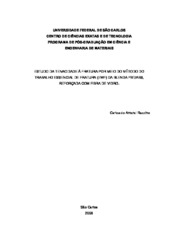Estudo da tenacidade à fratura por meio do método do trabalho essencial de fratura (EWF) da blenda PBT/ABS, reforçada com fibra de vidro
Abstract
High rubber content acrylonitrile-butadiene-styrene terpolymer (ABS) has been used to tough PBT. As a result, super tough PBT/ABS blends under notched Izod impact have been obtained. However, there has been a significant reduction in the PBT/ABS Young modulus. The development of an optimum stiffness-toughness balance in PBT/ABS blends can be achieved by addition of short glass fibers to the composite blends. The composite performance is strongly dependent on the matrix-fiber interface and consequently the surface treatment of the fiber is a key factor to be considered. In the present work, the effect of two kinds of glass fibers treatment on the mechanical properties of PBT/ABS blends is investigated and the results discussed in terms of the changes of the fiber wettability and interfacial adhesion strength of the fiber to the resin. The processing conditions used to prepare glass fiber reinforced tough PBT/ABS blends were studied to observe the best conditions to maintain the toughness and stiffness of the blend as high as possible. A twin screw extrusion was used to prepare the reinforced PBT/ABS blends. Tensile, impact and essential work of fracture (EWF) testing was carried out to evaluate the mechanical properties for stiffness and toughness of the reinforced blends, respectively. The results have shown a strong dependence of the mechanical properties on the surface treatment of the fibers and these results are corroborated by electron microscopy micrographs that clearly illustrate the changes in the composite fiber/matrix interface in the presence of differences in surface treatments of the fiber. The development of an optimum stiffness-toughness balance in PBT/ABS blends was achieved and EWF has been successfully applied to evaluate the toughness for PBT/ABS blends.
